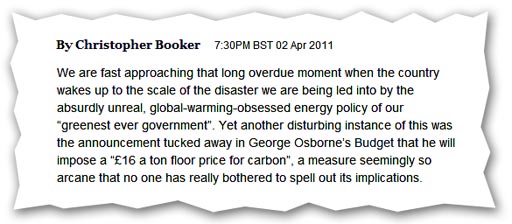Booker flagged up the implications two years ago almost to the day (2 April 2011, to be precise – extract above). He had another go on 29 September 2012, when he warned us that it was set to "double UK electricity bills". Again he raised the issue on 15 December 2012, and then on 23 February of this year and also 23 March.
Those were but a few instances in The Sunday Telegraph, in addition to which Booker raised the issue in The Daily Mail on 27 March.
To be fair, even Tim Yeo, the Conservative chairman of the Energy Select Committee, warned about the harmful effect of the tax, in March last year, and the BBC actually picked it up inOctober 2011, after industry complained of the costs.
Reuters own market analyst, Gerard Wynn, did the story on 19 March, calling the tax "unfair and ineffective", with The Times reporting, "Anger at ' stealth raid' on utility bills" on 21 March.
However, only now as the carbon tax actually comes into effect, and Tony Cocker, chief executive of E.ON UK attacks it, does the legacy media take notice and treat it as mainstream news. Thus we have the Daily Telegraph and the Daily Mail both telling the story today, calling it a "stealth" tax.
But this is only a "stealth" tax insofar as the media has given it such scant attention that it has barely registered with the general public. We even got some newspapers, such as theExpress, publicising the Energy Bill Revolution - a campaign alliance of 120 companies, charities, consumer groups and unions – and its ideas for spending the tax.
Stealth or not, though, this is a tax, and highly regressive: it is hitting those on low incomes proportionately much harder than those better off. Thus, it always was a bad idea, and one that should never have been allowed to come into force.
A little more protest might have made the chancellor think about it, but since it has been given such little attention, he has got away with it for now. And calling it a "stealth" tax isn't going to make it any better, or easier to pay. A tax is a tax, whatever name it is given.
COMMENT THREAD
